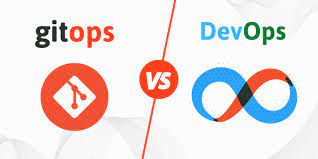Imagine this: you’re at a lively dinner party, surrounded by tech enthusiasts, and the conversation inevitably steers toward DevOps. Suddenly, someone throws in a curveball, mentioning GitOps. You glance around, and it’s clear – a debate is about to unfold. DevOps versus GitOps, the ultimate showdown!
In this guide, we’re going to break down the differences between these two heavyweights in the world of continuous delivery. So grab a virtual seat at the table, and let’s dive in.
Round 1: The Origins
DevOps: DevOps is like that wise elder who’s seen it all. Born out of the need to bridge the age-old gap between development and operations teams, DevOps emerged to foster collaboration and streamline software delivery. It emphasizes culture, automation, and shared responsibilities, bringing harmony to the software development life cycle.
GitOps: GitOps, on the other hand, is a cool newcomer with a fresh perspective. It takes inspiration from DevOps but adds a Git-centric twist. GitOps centers everything around version control. In this corner, we have Git repositories as the single source of truth for both infrastructure and application code.
Round 2: The Workflow
DevOps: DevOps is all about pipelines and automation. Continuous Integration (CI) and Continuous Deployment (CD) pipelines are the stars of the show. Developers commit code, CI pipelines run tests, and if all goes well, CD pipelines push updates to production. It’s like a well-orchestrated dance.
GitOps: GitOps, on the other hand, brings a bit of simplicity to the table. Changes are made by modifying Git repositories. When a change is pushed, GitOps tools detect it and automatically synchronize the desired state of the system with the code. It’s like having an obedient robot following your Git commands.
Round 3: The Tools
DevOps: DevOps tools are like a treasure trove of options. Jenkins, Travis CI, CircleCI, Ansible, Puppet, Docker – the list is endless. You can mix and match to build your dream DevOps toolkit. Flexibility is the name of the game here.
GitOps: GitOps is a bit more specific in its toolset. Git repositories reign supreme, and tools like ArgoCD and Flux are the knights in shining armor. These tools watch your Git repositories for changes and take action accordingly, ensuring that your infrastructure stays in sync with your code.
Round 4: The Philosophy
DevOps: DevOps is all about collaboration and breaking down silos. It preaches the importance of communication between development and operations teams. It’s like a campfire where everyone gathers to share stories and marshmallows.
GitOps: GitOps is more like the minimalist artist. It believes in simplifying processes and reducing complexity. By using Git as the source of truth, it aims for a declarative, self-healing system where changes are versioned, auditable, and controlled.
Round 5: The Final Verdict
So, who wins in the showdown between GitOps and DevOps? Well, it’s not about choosing a winner, but rather finding what works best for your team and your projects.
- If you’re deeply entrenched in DevOps and love the flexibility it offers, stick with it.
- If you’re looking for a streamlined, Git-driven approach that simplifies your continuous delivery process, GitOps is worth exploring.
In the end, it’s all about your team’s preferences, your project’s requirements, and your desire to embrace new approaches to solve old problems.
As the debate at the dinner party rages on, remember that the world of technology is ever-evolving, and both DevOps and GitOps are valuable players in the game of continuous delivery. So, grab another slice of pizza, and enjoy the conversation!
#GitOps #DevOps #Continuous #Delivery #Journey


